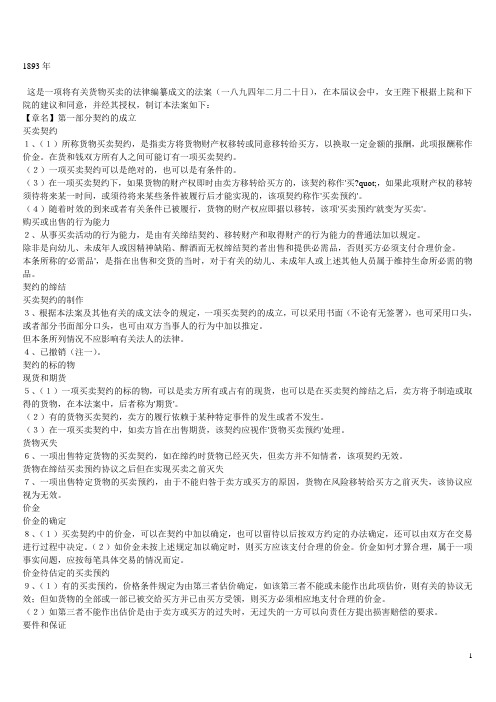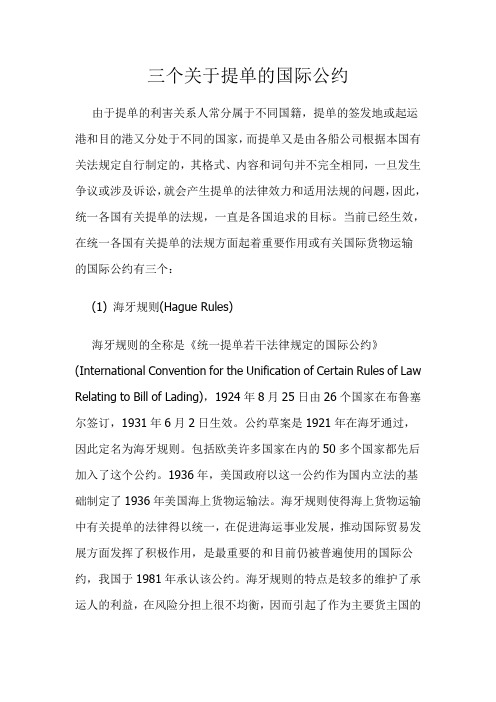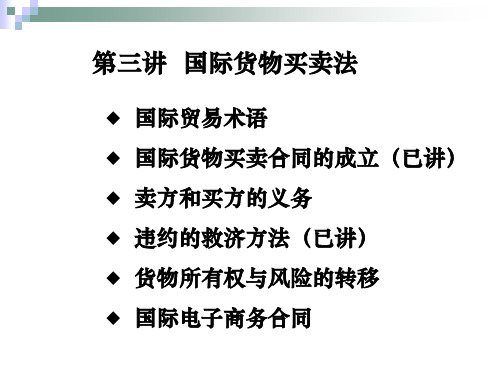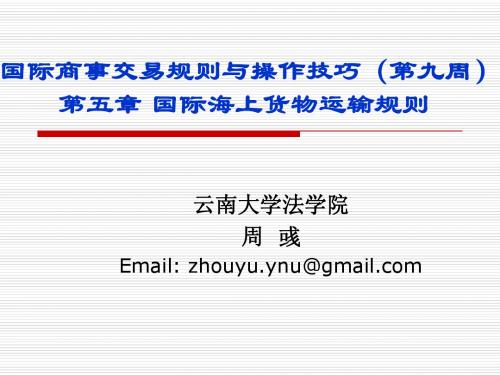英国国际货物买卖:提单规则
英国货物买卖法

1893年这是一项将有关货物买卖的法律编纂成文的法案(一八九四年二月二十日),在本届议会中,女王陛下根据上院和下院的建议和同意,并经其授权,制订本法案如下:【章名】第一部分契约的成立买卖契约1、(1)所称货物买卖契约,是指卖方将货物财产权移转或同意移转给买方,以换取一定金额的报酬,此项报酬称作价金。
在货和钱双方所有人之间可能订有一项买卖契约。
(2)一项买卖契约可以是绝对的,也可以是有条件的。
(3)在一项买卖契约下,如果货物的财产权即时由卖方移转给买方的,该契约称作'买?quot;,如果此项财产权的移转须待将来某一时间,或须待将来某些条件被履行后才能实现的,该项契约称作'买卖预约'。
(4)随着时效的到来或者有关条件已被履行,货物的财产权应即据以移转,该项'买卖预约'就变为'买卖'。
购买或出售的行为能力2、从事买卖活动的行为能力,是由有关缔结契约、移转财产和取得财产的行为能力的普通法加以规定。
除非是向幼儿、未成年人或因精神缺陷、醉酒而无权缔结契约者出售和提供必需品,否则买方必须支付合理价金。
本条所称的'必需品',是指在出售和交货的当时,对于有关的幼儿、未成年人或上述其他人员属于维持生命所必需的物品。
契约的缔结买卖契约的制作3、根据本法案及其他有关的成文法令的规定,一项买卖契约的成立,可以采用书面(不论有无签署),也可采用口头,或者部分书面部分口头,也可由双方当事人的行为中加以推定。
但本条所列情况不应影响有关法人的法律。
4、已撤销(注一)。
契约的标的物现货和期货5、(1)一项买卖契约的标的物,可以是卖方所有或占有的现货,也可以是在买卖契约缔结之后,卖方将予制造或取得的货物,在本法案中,后者称为'期货'。
(2)有的货物买卖契约,卖方的履行依赖于某种特定事件的发生或者不发生。
(3)在一项买卖契约中,如卖方旨在出售期货,该契约应视作'货物买卖预约'处理。
国际航运经典案件:FCR单证的法律性质及货运代理人的提单签发义务

国际航运经典案件:FCR单证的法律性质及货运代理人的提单签发义务〖案情〗原告:绍兴县京成贸易有限公司被告:埃彼穆勒环球物流(上海)有限公司2007年11月,原告委托被告将两只集装箱装载的针织女式长裤出运至英国南开普敦港。
原告按被告的要求填写了货物托运单,载明要求正本提单3份。
被告收到托运单后,向原告发出确认单,在确认单右上角记载为FCR,该确认单记载的托运人、收货人、通知方同托运单一致,并载明包括订舱代理费等收费明细。
12月6日,被告签发FCR,上面记载有托运人、收货人、通知方等事项,记载内容与托运单相同。
另在FCR右下角的英文字样译文为“以下日期签署三份FCR,一旦其中一份被使用,其余即行失效”。
FCR背面记载:“除了另有注明,收到表面状况良好的货物将按照承运人的正式提单条款持有和运输;货物将在交货地交付给收货人,收货人在提货时不需要提交正本运输行货物收据。
一旦马士基物流公司收到托运人的货物,收货人可以全权处分该货物”。
被告接收货物后,委托NYK公司实际出运,在NYK公司签发的海运单上记载托运人为被告的宁波分公司,收货人为马士基物流公司,通知方为凤凰公司,起运港、卸货港、货物品名,数量和FCR相同。
原告收到FCR后,附于信用证交付银行结汇。
后因信用证不符点被银行退回,退单理由之一是未按信用证要求交付提单。
原告诉称,被告作为承运人,未向原告签发提单且擅自放货造成原告损失,请求判令被告赔偿货款损失。
被告辩称,其为收货人在起运港的收货代理人,依据与收货人之间的约定向原告签发FCR并无过错,且原告已经收到货款,并无实际损失。
〖裁判〗上海海事法院审理认为,原告向被告发放托运单,托运单上记载的事项可以证明原告对订立海上货物运输合同的要约,被告接受该托运单,向实际承运人订舱,并出运货物。
据此,原、被告之间的海上货物运输关系成立。
同时,涉案FCR记载的内容与提单格式几乎完全一致,可以表明原、被告对涉案运输合同具体事项已作出约定且已实际履行,FCR的内容,可证明原、被告之间海上货物运输合同关系成立。
三个关于提单的国际公约

三个关于提单的国际公约由于提单的利害关系人常分属于不同国籍,提单的签发地或起运港和目的港又分处于不同的国家,而提单又是由各船公司根据本国有关法规定自行制定的,其格式、内容和词句并不完全相同,一旦发生争议或涉及诉讼,就会产生提单的法律效力和适用法规的问题,因此,统一各国有关提单的法规,一直是各国追求的目标。
当前已经生效,在统一各国有关提单的法规方面起着重要作用或有关国际货物运输的国际公约有三个:(1) 海牙规则(Hague Rules)海牙规则的全称是《统一提单若干法律规定的国际公约》(International Convention for the Unification of Certain Rules of Law Relating to Bill of Lading),1924年8月25日由26个国家在布鲁塞尔签订,1931年6月2日生效。
公约草案是1921年在海牙通过,因此定名为海牙规则。
包括欧美许多国家在内的50多个国家都先后加入了这个公约。
1936年,美国政府以这一公约作为国内立法的基础制定了1936年美国海上货物运输法。
海牙规则使得海上货物运输中有关提单的法律得以统一,在促进海运事业发展,推动国际贸易发展方面发挥了积极作用,是最重要的和目前仍被普遍使用的国际公约,我国于1981年承认该公约。
海牙规则的特点是较多的维护了承运人的利益,在风险分担上很不均衡,因而引起了作为主要货主国的第三世界国家的不满,纷纷要求修改海牙规则,建立航运新秩序。
(2) 维斯比规则(Visby Rules)在第三世界国家的强烈要求下,修改海牙规则的意见已为北欧国家和英国等航运发达国家所接受,但他们认为不能急于求成,以免引起混乱,主张折衷各方意见,只对海牙规则中明显不合理或不明确的条款作局部的修订和补充,维斯比规则就是在此基础上产生的。
所以维斯比规则也称为海牙---维斯比规则(Hague-Visby Rules),它的全称是《关于修订统一提单若干法律规定的国际公约的议订书》(Protocol to Amend the International Convention for the Unification of Certain Rules of Law Relating to Bill of Lading),或简称为“1968年布鲁塞尔议订书”(The 1968 Brussels Protocol),1968年2月23日在布鲁塞尔通过,于1977年6月生效。
国际货物买卖法

“Conformity of the goods” means not only conformity with the explicit or implicit terms of a contract, but also conformity with the “implied terms” of the Article 35.
《公约》不适用的货物买卖(P144)
CISG不适用以下列形式的货物买卖—— 仅供私人、家人或家庭使用的货物买卖; 拍卖形式进行的销售; 根据法律执行令状或其他令状的销售; 股票、债券、货币和其他投资证券的交易; 船舶、飞机、气垫船的买卖; 电力的买卖。
5.3 Obligations for seller and buyer
Chapter Five
Law of International Sale of Goods 国际货物买卖法
Contents
5.1 Introduction to CISG 5.2 Formation of Contract 5.3 Obligations of the Seller and Buyer 5.4 Remedies for Breach of Contract 5.5 Passing of Risk 5.6 A Standard Contract for International Sales of Goods
3、货物买卖 4、最后条款
CISG is specifically limited to the formation of the contract of sale and the rights and obligations of the seller and the buyer arising from such a contract.
国外海关清关 提单 格式 -回复

国外海关清关提单格式-回复国外海关清关提单格式: 一步一步回答海关清关是跨境贸易中非常重要的一环,其中提单是海关清关过程中必不可少的文件。
本文将一步一步回答关于国外海关清关提单格式的问题,详细解释每个步骤的含义和要求。
1. 什么是国外海关清关提单?国外海关清关提单,又称为装箱清单或货物清单,是一份详细列明了货物的数量、重量、货物种类以及相关贸易条款的文件。
它是国际贸易中运输货物的必要文件之一,用于海关报关和货物入境申报。
提单通常由国际货运代理或承运人提供。
2. 国外海关清关提单有哪些常见格式?国外海关清关提单有多种常见格式,其中最常用的是香港货运协会(HKTA)发行的标准海运提单,即B/L(Bill of Lading)。
其他常见格式还包括航空提单(AWB)和铁路提货单(Railway Receipt)等。
3. B/L提单的格式是什么样的?B/L提单是国际海运运输中使用最广泛的提单格式之一。
其格式通常包括以下几个重要部分:- 提单头部:包括承运人公司名称、提单号码和船名/航空公司代码等信息。
- 装货地和目的地:列明货物的装货地和目的地,通常包括国家、城市和港口/机场等信息。
- 收货人和发货人:列明收货人和发货人的姓名、地址、联系方式等信息。
- 货物描述:详细列明货物的名称、数量、重量、包装种类等信息。
- 货运费用和费用支付方式:包括运输费用、保险费用等费用的具体金额和支付方式。
- 贸易条款:列明贸易的条件和约定,如运输条款、付款方式等。
4. AWB提单的格式是什么样的?AWB提单是航空运输中使用的提单格式,其格式与B/L提单有所不同。
AWB提单通常包括以下几个重要部分:- 提单头部:包括航空公司名称、航班号和出发地/目的地等信息。
- 收货人和发货人:列明收货人和发货人的姓名、地址、联系方式等信息。
- 货物描述:详细列明货物的名称、数量、重量、包装种类等信息。
- 货运费用和费用支付方式:包括运输费用、保险费用等费用的具体金额和支付方式。
国际商法货物买卖法

本案中哪一方当事人负责安排海上运输?
三、卖方和买方的义务
凡双方当事人在合同中已经规定的权利与义务, 按照合同规定执行;未规定或规定不明确的,援引国 内法或《公约》。
本节主要讲述合同未规定或规定不明确时,买卖 双方应承担的义务。
(一)卖方的义务
交付货物; 移交与货物相关的单据; 对货物的品质担保; 对货物的权利担保
分类 公约
交货地点
●涉及货物运输:则 卖方将货物交给第一 承运人,风险由卖方 转向买方
●不涉及货物运输, 但特定物,在该地点 把货物交给买方
●除此:在订立合同 时卖方营业地点交货
交货时间
I.确定时间的, 按规定
II.确定一段时间 的,卖方有权决定 在期间的任一天。
III.合理时间
案例
杭州A进出口公司向日本B公司出口一批罐装山野菜, 合同约定卖方应不迟于2006年3月底发运货物。双方 均知道该批货物将在台州加工完毕并包装出口。如果 双方未对交货地点进行具体约定,根据《公约》,卖 方应在哪个地点履行交货义务?
结论:本例涉及运输,交货点为货交第一承运人。如 果A公司在台州将货物装车运输,则交货地为台州;卖 方也可在杭州或上海货交第一承运人,则交货地为杭 州或上海。
2. 移交与货物相关的单据
装运单据——是买方提取货物,办理报关手续,转 售货物以及向承运人或保险公司请求赔 偿所必不可少的文件。
提单 保险单 领事发票 原产地证书,重量证书和品质检验证书等
风险转移 出口手续 运输 保险 进口手续 适用
F海上内河
CFR 船舷
S
S
B
B
海上内河
CIF 船舷
S
SS
提单的基本知识

一、提单的基本知识1.提单的定义与关系人定义:海运提单(Marine Bill of Lading or Ocean Bill of Lading),或简称为提单(Bill of Lading, B/L),是国际结算中的一种最重要的单据。
《汉堡规则》给提单下的定义是:Bill of lading, means a document which evidences a contract of carriage by sea and the taking over or loading of the goods by the carrier, and by which the carrier undertakes to deliver the goods against surrender of the document. A provision in the document that the goods are to be delivered to the order of the document. A provision in the document that the goods are to be delivered to the order of a named person, or to order, or to bearer, constitutes such an undertaking.《中华人民共和国海商法》(1993年7月1日施行)第71条规定:“提单,是指用以证明海上货物运输合同和货物已经由承运人接收或者装船,以及承运人保证据以交付货物的单证。
提单中载明的向记名人交付货物,或者按照指示人的指示交付货物,或者向提单持有人交付货物的条款,构成承运人据以交付货物的保证。
”关系人:提单的主要关系人是签订运输合同的双方:托运人和承运人。
托运人即货方,承运人即船方。
2.提单的功能提单具有以下三项主要功能:(1)提单是证明承运人已接管货物和货物已装船的货物收据.对于将货物交给承运人运输的托运人,提单具有货物收据的功能。
国际商事交易规则与操作技巧(delivered)10(1)

(一)按签发提单时货物是否已经装船来 分
已装船提单(SHIPPED OR ON BOARD BILL OF LADING)是指货物装上船只之 后,由承运人签发给托运人的提单。这种提 单必须载明装货船名和装船日期。 备运提单(RECEIVED FOR SHIPMENT OF LADING)又称收货待 运提单,这是承运人在收到货物但尚未把货 物装上船只以前签发给托运人的一种提单。
案例:保险公司ቤተ መጻሕፍቲ ባይዱ广州远洋运输公司案
广泛远洋运输公司的“辽阳”轮和“虎林”轮各载 货方2000公吨重烧镁抵达目的港鹿特丹。收货人在 检验中发现两轮所运货物都混入了杂质,货方为此 付出检验费、清理费和加工费。因为货方对这批货 物进行了保险,所以损失由保险公司进行了赔偿。 随后保险公司要求广州远洋运输公司对上述费用予 以赔偿,向中国海事仲裁委员会提出了仲裁申请。 仲裁庭经调查发现,两轮所载重烧镁在装船前就混 有杂质,而这种杂质是装船过程中可以发现的,但 承运人在提单上对此没有记载,签发了清洁提单。 既如此,就意味着装船时货物不含杂质,所以,仲 裁庭裁决广运公司赔偿保险公司这笔费用损失。
倒签提单
例如,某外贸公司A与英国B公司签订了一个国际货物 买卖合同。根据合同的规定,装船日期为9月20日。因 A公司备货不及时,以至该合同项下的货物未能在合同 规定的装船日期装运货物。一直到9月30日才装上船。 A公司为了保证安全收汇,使提单符合信用证的要求, 就请求承运人在提单上填写合同规定的装船日期。B公 司收到提单后发现可疑,经查实A公司提交的提单是倒 签提单。B公司即以A公司违反合同要求赔偿损失。在 该案中,A公司显然违反了卖方的交货义务。在国际货 物买卖中,根据海上运输常使用的国际贸易术语FOB、 CIF和CFR的规定,卖方必须在规定的日期或期间内, 在装运港将货物交至船上。A公司既然未在合同规定的 装运日期装船,B公司当然有权提出赔偿损失的要求。
- 1、下载文档前请自行甄别文档内容的完整性,平台不提供额外的编辑、内容补充、找答案等附加服务。
- 2、"仅部分预览"的文档,不可在线预览部分如存在完整性等问题,可反馈申请退款(可完整预览的文档不适用该条件!)。
- 3、如文档侵犯您的权益,请联系客服反馈,我们会尽快为您处理(人工客服工作时间:9:00-18:30)。
Word count: 1981 wordsIntroduction (1)1. Byers may reject the bills of lading (1)2. Byers may reject the goods and ask the bills of lading corrected (2)3. Byers may claim damages against Sellars, the carrier or the insurer or bear the losses him self (3)IntroductionBill of lading, as a document invented by European merchants, now has been the foundation of international trade and transportation through hundreds years of practice, custom and improvement. The most common model adopted in international trade is CIF(Cost, Insurance and Freight) or CFR(Cost and Freight). International sale of goods is often called "sale of instruments" , herein instruments mainly refer to bills of lading.A bill of lading is a document issued by a carrier to a seller. A bill of lading has mainly three characteristics: it performs the functions as a receipt of goods, as a title of ownership and as the proof of carriage contract. A bill of lading must be clean and describe goods and its quality and quantity precisely to make sure the trade proceeds smoothly. The seller must use every efforts to deliver the bills of lading to the buyer to perform his obligations.Aggie and the carrier altered the bills of lading and named Sellars as the shipper, which had breached his obligations of recording the bills of lading correctly.1. Byers may reject the bills of ladingIn order to proceed international trade more effectively, people made some fixed terms for use. The most important terms are CIF and FOB. Both terms are only used in the circumstances of delivery by sea or inner rivers. People simply use these terms without reaching other agreements to set out their duties.CIF and FOB are the terms of INCOTERMS. CIF is short for "Cost, Insurance and Freight(named port of destination)", in which stipulates that the seller must pay transport fees and relevant costs to deliver the goods to the named port, but after handing over the goods risks pass to the buyer. Besides, under CIF the seller must sign contract of insurance for the goods and pay insurance fees. The seller is bound to clear the goods from export customs. Accordingly the buyer must undertake risks after the goods are handed over to him and make payment. FOB is short for "Free On Board(named port of shipment port)". Under the term the buyer is responsible for the transportation and insurance of the goods, risks pass to the buyer when the goods are over the boundary of the ship. Compare with CIF, the buyer must undertake more liabilities and risks under FOB.In the captioned case, parties use the term of "CIF" which means the seller is responsible fortransportation and insurance and undertake risks until the goods arrive the destination port. Sellars sold the goods CIF to Byers while the goods were still en route from Tony. As Byers mentioned that he will refuse the goods which had ever had anything to to with Tony, Aggie, the agent of Sellars, without Sellars's acknowledge arranged with the carrier to alter the bills of lading to name Sellars as the shipper. A bill of lading must record everything on it compling with the fact and correctly and the seller and the carrier shall not intentionally forge a bill of lading. Byers is entitled to the whole 3 bills of lading. It is held in Sanders Bros v McLean 1883 that the seller must use every efforts to deliver the whole set of bills of lading to the buyer. After the case, buyers and banks began to require whole set of the bills of lading must be received.Aggie offered only one of bills of lading to Byers. Therefore the conclusion is that Byers can reject the bill of lading because incomplete bills of lading may lead him fails to possess the goods.2. Byers may reject the goods and ask the bills of lading correctedSince Byers decided to accept the bill of lading and paid the price of the goods before he found the wrong record on the bill of lading. The bill of lading incorrectly named Sellars as the shipper while it also stated that the goods were received from Tony.In the captioned case, Tony is the seller to Sellars and Sellars is the seller to Byers. The title had been transferred to Sellars since he had obtained the bill of lading, besides, according to s17 of Sale of Goods Act 1995, property passes when the seller intended to pass it in the goods, therefore Sellars had obtain the ownership of the goods and he may sell them to anyone he likes. There is no legal problem for him to sell the goods if he had made full payment to Tony.Byers had told Aggie that he would refuse any goods in any relations to Tony. So Aggie arranged the alteration with the carrier. It is held in Mendala III Transport v Total Transport Corp 1993 that before the bills of lading are altered or added new items, consent of each party shall be obtained. The bill of lading must record on it as what the fact is. In case SIAT v Tradax it is held that "The buyers did not have to accept the amended Bills of Lading which was added "V enezia" as a discharged port. Possible buyers would not accept Bills of Lading, which had been altered unless (possibly) the changes were only minor. It did not matter that the amended Bills accurately stated the terms on which the contract of carriage had been agreed." Byers was deceived and therefore he shall be indemnified. Byers did not have to accept the bill of lading due to that the alteration was not agreed, but since he decided to accept the bill of lading, "bona fide" as the principle of civil law will apply, he shall not again reject the bill of lading.But acceptance of bill of lading does not prevent him from rejecting the goods. Rejection of goods and bill of lading are 2 separated rights. Although Byers accepted the bill of lading and paid, he is entitled to reject the goods. He may reject the goods until the incorrect item is corrected. At this time he is not bound to return the goods according to s36 of Sale of Goods Act 1995:" Unless otherwise agreed, where goods are delivered to the buyer, and he refuses to accept them, having the right to do so, he is not bound to return them to the seller, but it is sufficient if he intimates to the seller that he refuses to accept them."As an agent, Aggie must exercise his power within the scope defined by the principal. Any actions beyond the power attorney shall not be implemented unless the principal's consent has beenobtained. In the captioned case, it is the agent and the carrier jointly forged the bills of lading and Sellars should not be responsible for their behaviour since he did not know it. Sellars may refuse to commit the legal effect of action by Aggie and the action will not bind on him. Therefore it is Aggie, the agent, who shall be responsible for the infringement.Although at the meeting with Aggie Byers had not noticed the contradictory, he is entitled to notify the contradictory to Aggie, the carrier within a reasonable period. He may notify the seller to reject the goods within a reasonable time.CIF, as mentioned above, under which the buyer has no right to ask the goods must be delivered from a special shipper. As the case mentioned, the goods were en route to Cape Town when the buyer mentioned that he would never dealt any transaction in relation to Tony. The requirement is unreasonable. 1. Under CIF term Byers has no right to make such requirement; 2. This is not stipulated in the sale contract; 3. Such requirement shall be made before the goods are loaded so the buyer can change the shipper to meet the requirement.Besides, the buyer suffered no financial losses resulted from the alteration. So he has no right to claim damages at this aspect.The conclusions are as follows:(1)Byers is entitled to reject the goods from Tony. He may notify Aggie and the carrier the unconformity and ask them to produce a true and precise bill of lading.(2)Byers is not entitled to reject the bill of lading since he had accepted them.(3)Byers suffers no financial losses so he has not right to claim such damages.3. Byers may claim damages against Sellars, the carrier or the insurer or bear losses himselfAs mentioned above, under the term of CIF, it is the seller who shall be responsible for the transportation and insurance for the goods. In the captioned case, Byers suffered a lack of goods. Lack of quantity of the goods may be caused by various reasons.The seller is bound to provide a quantity of goods specified in the sale contract. If the seller provided goods with a quantity less than specified in the contract, then the seller must be responsible for its fault. According to Article 25 of CISG, which stipulates that: "A breach of contract committed by one of the parties is fundamental if it results in such detriment to the other party as substantially to deprive him of what he is entitled to expect under the contract, unless the party in breach did not foresee and a reasonable person of the same kind in the same circumstances would not have foreseen such a result." The captioned circumstance has constituted a fundamental breach of contract and therefore Byers is entitled to repudiate the contract and claim damages caused by the breach.S30 of Sale of Goods Act 1995 provides the solution for when delivery of wrong quantity. The buyer may reject all of the goods had been delivered, but if he has accepted the goods he shall pay for them at the price specified in the contract.The carrier must take reasonable care of the goods according to the contract of carriage between the carrier and the seller. If the lack of goods is caused by the carrier's fault, then he shall be responsible to compensate losses of the buyer under the contract of carriage. A lawful holder of the bill of lading is entitled to sue the carrier to claim damages for his fault.Lack of goods may be caused by storm, fire and other insured accidents. In this situation the insurer company shall undertake relevant liabilities under insurance policies or contracts.The goods may be of satisfactory quality and comply with the contract, but lack of goods may be caused by the buyer it self, such as he had ordered a wrong quantity of goods, then the buyer shall bear the losses itself.The conclusions are as follows:(1)Byers is entitled to require the buyer to make up the lack goods and compensate his relevant losses; he may also reject the goods, but if he has accepted them he must pay for them at the contract price; if the seller refuses to deliver the lack goods, then Byers may require to deduct the contract price of the goods; Byers shall not reject the goods if he had accepted;(2)Byers is entitled to repudiate the contract with Sellars and claim damages, in this circumstance he is entitled to ask his payment repaid back to him;(3)Byers may sue the carrier to claim damages for his fault in taking care of the goods according to the contract of carriage, although he is not a party thereto;(4)Byers may sue the insurer to claim damages if there happened an insured accident which reduced the goods, although he is not a party to the insurance policies;(5)If the lack of goods is caused by Byers itself, he shall bear relevant lossess himself.ReferencesSanders Bros v McLean 1883The case SIAT v TradaxS17, s36, s30, the Sale of Goods Act 1995Mendala III Transport v Total Transport Corp 1993RULES FOR ANY MODE OR MODES OF TRANSPORT(INCOTERMS2010)Article 25, United Nations Convention on Contracts for the International Sale of Goods (CISG)。
